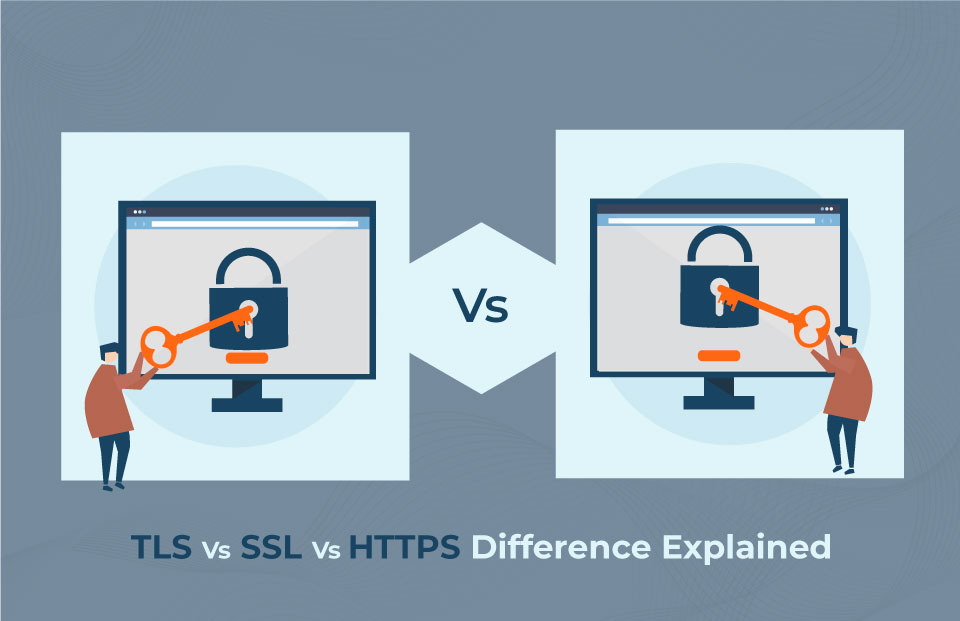TLS Vs SSL Vs HTTPS: Decoding the Major Differences

Understanding TLS Vs. SSL Vs. HTTPS for the better encryption protocols to protect website data.
In the world of website security, acronyms can almost be as irritating as that Arturo character from the TV show ‘Money Heist’ if you are just starting to know about website encryption. Although Arturo never really dies in the entire show, in our opinion, we can turn him off and watch something else. However, when it comes to the lingo or acronyms of the website section, you have to buckle up and learn it all. So, let us get started by talking about each and what TLS vs SSL vs HTTPS is all about.
Unfortunately, given that all of us create, upload and send approximately 2.5 quintillion bytes of data every day, monitoring all of the information zipping around the internet is not particularly easy. This is where data encryption and authentication come into play. So let us first understand what it is:
What Is Data Encryption and Authentication?
Data encryption and authentication prevent confidential data from falling into the hands of cyber criminals and hackers. By scrambling the data as it is, encryption is achieved. In this process, the web server, also known as the intended recipient, receives a special key in the form of instructions that details how to unscramble the data. With the help of the keys, the server decodes the encrypted data. Without the key, anyone who happens to intercept the encrypted data during transmission will not be able to understand it as it will only mean some meaningless gibberish to them.
However, for this arrangement to work, the sender and receiver must establish an agreement of some type, failing which the two sides would not have the information they would need to encrypt and decrypt the data they exchange. We use multiple security and cryptographic protocols, known as SSL or TLS, to facilitate the process. Therefore, we must individually understand what is what. Let us start with SSL:
About SSL Certificate
In its early phases, the Internet was used by people in the military and people who wanted to research. With time it expanded to basic use, and thus, the commercialization process of the Internet started. This resulted in sharing their private information, such as financial information, personal data, etc., with businesses. Since people started sharing private details, the need to protect them from hackers or cybercriminals arose.
SSL, a short form for Secure Sockets Layer, is a cryptographic security protocol that is responsible for securing all your confidential information as it transmits across the digital space. Basically, a protocol means a set of rules that computers use for communicating with each other. It can be defined as the value system of computer systems.
SSL was developed to thwart any unauthorized third party from tampering or intersecting the sensitive data while it is being transmitted over the Internet. Developed and released by Netscape, SSL is the first of such cryptographic protocols. SSL 1.0 was its first version but was never got released in 1995; the second version, SSL 2.0, was released. It, too, had some security deficiencies, and as a result, SSL 3.0 came into existence. This version, too, had some security flaws, which led to the creation of another protocol, which goes by the name of TLS or Transport Layer Security. Before we start discussing TLS, remember that SSL 2.0 and 3.0 are no longer in existence, and no web browsers support them. Now, let us get into TLS.
About TLS Certificate
TLS or Transport Layer Security is a more secure version of SSL. According to security experts, a better and more secure protocol needs to be developed due to some of the major security flaws in SSL. First defined in 1999, TLS 1.0 is the successor to SSL 3.0, and since then, the experts have released three more versions of TLS. The most current release in 2018 is TLS 1.3.
TLS certificates have become a standard for all major web browsers to ensure a safe internet experience for all users. Typically, internet users trust websites secured by TLS certificates as they encrypt and protect private information transferred to and from the website. Apart from this, it also represents or verifies your website’s brand identity. In this way, the certificate can be considered a security measure and identity protection.
Oftentimes, people get confused and have questions like what is TLS vs SSL. Let us clear the air that TLS is everything SSL, except for the security flaws. Simply put, TLS is an updated version of the SSL. Now, let us see how SSL/TLS is used in Certificates.
What is the difference between SSL and TLS in encryption algorithm?
With SSL/TLS protocols, communication of two endpoints takes place between two endpoints. Basically, they are a set of rules responsible for governing the data transmission between server and client. These digital certificates are X.509 digital files installed on a web server issued by an independent third party called a certification authority that conducts verification of your website.
TLS or SSL certificates work as part of public key infrastructure (PKI) and involve the application of two keys — public and private keys. As the name suggests, a public key stays public while a private key is kept by the server that receives the message. While both the keys are distinct, they are mathematically related to each other. The information encrypted by a public key can only be decrypted by a private key related to it. The whole communication happens under the rules governed by SSL/TLS.
If you think the term ‘SSL’ is still used, it is because the industry lingo takes time to change. In any case, SSL is more commonly used when compared to TLS, so users have a tendency to stick to the old terminology.
Another common question people ask is which is more secure- SSL TLS or HTTPS? To answer this question, let us understand what HTTPS is.
What is HTTPS?
HTTP is a protocol defining how messages are formatted and transmitted. HTTPS is a secure version of HTTP as it uses SSL as a sublayer. When a website uses HTTPS in its web address, it shows that TLS certificates encrypt any communication taking place between a browser and server. In other words, if your website is using HTTPS, all the information is safe and secure. So, to answer a common question which is- does HTTPS use TLS? The answer is yes, which is why the former is considered safe.
While HTTPS, SSL, and TLS are all related to encrypted internet connections, they do not exactly translate to the same meaning, which is why there is a debate about SSL vs TLS vs HTTPS.
Let us walk you through how SSL/TLS relates to HTTPS.
How Does SSL or TLS Relate to HTTPS?
When users set up an SSL or TLS certificate, the website is configured to transmit data with the help of HTTPS. The two technologies go hand-in-hand; you cannot use one without the other. So, if you want to identify whether a site uses a secure digital certificate or not, look at the URL and check if it contains HTTP or HTTPS. If the site has HTTP, it is not safe; if it is HTTPS TLS, it is safe.
Oftentimes people question which is safe- HTTPS SSL or TLS. One of the major differences one might notice between both protocols is the way they establish connections. TLS handshake employs an implicit way of establishing a connection via a protocol, whereas SSL makes an explicit connection with the port. So when we talk about TLS vs HTTPS or SSL vs HTTPS, it means the former is responsible for governing the latter.
Regardless of all other differences, the fundamental feature that separates both TLS/SSL connections is the application of the cipher suite that governs the entire security of the connection.
One of the crucial parts of a TLS/SSL connection is to agree on a cipher suite that outlines a set of algorithms for bulk encryption, key exchange, authentication, message authentication code algorithms, etc., for a specific session. This means that every cipher suite supports a specific set of algorithms that enhance the overall security and connection performance.
Finally, let us explain the differences between HTTPS, SSL, and TLS
SSL, TLS, and HTTPS – Key Differences
TLS is what puts the S in HTTPS. So for a website to be designated secure, it needs to have up-to-date digital security certificates. And while SSL certificate is not strictly required, it is strongly recommended by all major browsers. In July 2018, Google Chrome started marking sites without TLS certificate as “not secure” warning away potential site visitors.
Other major browsers have followed the same. In fact, Google also rewards HTTPS sites with better search engine rankings, offering more incentives to webmasters to use SSL certificates. TLS has an almost ubiquitous presence across the web, and 90 of the world’s top 100 (non-Google) websites default to HTTPS.
Let’s compare TLS vs SSL vs HTTPS
| SSL | TLS | HTTPS | |
| What It Is | The first cryptographic protocol developed in 1995. | The successor of SSL that’s more secure. | The secure version of HTTP. |
| Versions | SSL 1.0, 2.0 & 3.0 | TLS 1.0, 1.1, 1.2 & 1.3. | There are no versions of HTTPS. |
| Use | No longer in use. | Currently used, but TLS 1.0 & 1.1 to be deprecated in early 2020 | Browsers mark sites that don’t use HTTPS as “not secure.” |
Conclusion of TLS vs SSL vs HTTPS
Did you know that the data shared across the digital space is not just vulnerable but also being actively targeted by cybercriminals? Beyond credit card information and passwords, cybercriminals are interested in acquiring even seemingly basic information that, if compromised, can create serious repercussions.
SSL happens to be a reliable solution, offering dependable data encryption and decryption to keep confidential information out of the wrong hands. However, it is not fool proof. In order to keep communications security within your network, you will need advanced network visibility and the power to decrypt once and route all of your traffic to suitable security and monitoring tools.
Read also about HTTP 1 Vs. HTTP 1.1 Vs. HTTP 2: A Detailed Analysis
